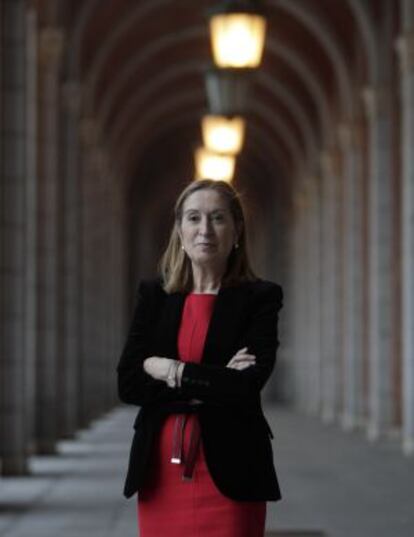“The solution for the turnpikes won’t cost taxpayers a euro”
Public Works Minister Ana Pastor sets out the government's plans for Spain's failed toll roads


The fiasco of the failed toll-road concession holders has become a hot potato for the Public Works Ministry. The minister, Ana Pastor, insists that the plan her department is working on to help out 10 such operators, eight of which are in receivership with combined debts of over 3.6 billion euros, "won't cost the taxpayer a euro." In an interview with EL PAÍS, Pastor also discusses plans to allow private railway operators to enter the sector next year.
Question. The government has decided to rescue the turnpike operators with liquidity problems. When do you see an agreement on this being reached?
Answer. Currently, there are 10 turnpikes with problems because traffic has slumped and the costs of expropriating land to build them have caused their costs to shoot up. The government is working on a number of alternatives to resolve the problem. One of these is to create a public company for them, with the second possibility being to change the State Contracts Law to amend the concession model. But whatever decision we take won't affect the pocketbooks of Spaniards or the public deficit.
Q. How would the law be changed?
A. We are looking at the models used in other countries for possible solutions.
Q. But do you expect an agreement soon?
A. We're working on it - both the Public Works Ministry and the Finance Ministry, along with the companies that hold the concessions and the banks.
Q. A lot of people have criticized the fact that the banks and toll-roads have been rescued while no help has been made available for members of the public with problems.
We won't privatize the AVE and Renfe will remain a public operator"
A. The government is looking for solutions. But what I need to make clear is that the solution to the problem of the turnpikes won't have an impact on the budget deficit nor cost taxpayers a euro.
Q. When will the privatization of AENA [the state airport operator] be approved?
A. We have carried out a far-reaching overhaul of airport management. When we came into power, AENA had negative cash flow of 600 million euros, and we will end this year with positive cash flow of 600 million. It had EBITDA [gross operating income] of 850 million euros, and we'll end the year with 1.6 billion. We have completed a total overhaul and now we're working on new regulations for airport operators as Italy, Britain and Germany have done. The regulations provide very clear rules with a view to the entry of private capital in AENA. It will be a five-year plan that allows the government to maintain control of the maintenance of the network, the quality of services, investments and rates charged. My plan is to have everything ready for the entry of private capital for when the government decides is the best moment to proceed. But the state will maintain a majority in AENA.
Q. If the state retains the majority, why are these regulations needed?
A. Because when private investors come on board, the state needs to provide guarantees and set the rules.
Q. You wouldn't be having second thoughts about this because of a possible lack of interest on the part of companies?
A. What concerns me is the general interest, the members of the public and something as important as tourism. This year we are going to beat the record for overseas arrivals.
Q. Why is passenger traffic at Madrid Barajas airport so weak?
There's a mismatch in supply and demand in the housing market"
A. We saw a change of trend for the airports as a whole in November and also Barajas. Numbers were up 3.5 percent for the network as a whole. But the airports that depend on domestic traffic have suffered a lot. Traffic has plummeted and has also fallen substantially on short-haul routes such as Rome and Paris. The situation of the airports on the coast is better because of tourism. In the case of Barajas, we are working with the regional government, town halls and players in civil society. The first piece of good news is that traffic at Barajas increased in November. The second is that the carrier Norwegian will have a base set up at Madrid in June. The rest of the airlines are clearly betting on Barajas. There will shortly be a new flight to Shanghai and a direct flight to Washington soon. We are working to open new routes in Spain as a whole. We have opened 305 and we are one of the countries that has opened the most routes during the crisis.
Q. Won't the arrival of low cost carriers such as Norwegian hit companies already here, such as Iberia?
A. This is a free market. We aim to provide the best conditions for airlines to operate at our airports. Currently, rates at Madrid and Barcelona are half of those at comparable airports. We have an agreement with the airlines that rates will rise 0.9 percent in 2014.
Q. Will the high-speed AVE train network be privatized?
A. No, the AVE will never be privatized. Renfe [the state railway operator] has undergone significant restructuring in agreement with the main labor unions. We have changed the marketing policy with excellent results, with an increase in the number of passengers and revenues. Many people who had never used the AVE before do so now. We can't allow trains to run when only 35 percent full. Very shortly, we're going to start up ticket sales through cellphones. We are going to install Wi-Fi. In the first half of next year we will open up high-speed and long-distance routes to competition, which will help improve the quality of services offered to customers and help Adif [the railway network manager] obtain more revenues to help pay for the enormous investment that has been made. But we're not going to privatize the AVE and Renfe will remain a public operator.
Q. Other countries have frozen or cut back on investment in high-speed trains. Can we allow ourselves the luxury of the AVE?
A. We will continue linking up the country through the railway network but with projects that are rational. We have finished the line to France; we have opened a line to Alicante despite the economic problems. We have rationalized investments: the cost of the Alicante station was projected at 150 million euros and finally cost six million.
Q. Highway engineers recently said more investment is required for the upkeep of roads. Meanwhile, many construction companies have to look abroad for work.
A. The ministry spends more than 800 million euros a year on road maintenance. Regarding companies looking overseas, we have supported their internationalization. In the period January-October, Spanish companies won overseas contracts worth 30 billion euros. Last year, the amount was 23 billion euros.
Q. What are your forecasts for the housing market?
A. We have amended the rental market law and encouraged home refurbishment. It seems a change in trend is starting and the stock of unsold apartments is falling. But I think the sector still has a lot of adjustment to go through. There is still a mismatch between supply and demand.
Q. Mariano Rajoy says 2014 will be the year of economic recovery. Why?
A. In our sector everything is pointing to a real recovery. The port sector, the main source of entry and exit of goods, will end the year with earnings of 285 million euros. There has also been a pick-up in traffic at the airports and for the first time since 2008, heavy goods vehicle traffic increased in November. But above all what has changed is the level of confidence in Spain. But we have to continue working to bring unemployment down.
Tu suscripción se está usando en otro dispositivo
¿Quieres añadir otro usuario a tu suscripción?
Si continúas leyendo en este dispositivo, no se podrá leer en el otro.
FlechaTu suscripción se está usando en otro dispositivo y solo puedes acceder a EL PAÍS desde un dispositivo a la vez.
Si quieres compartir tu cuenta, cambia tu suscripción a la modalidad Premium, así podrás añadir otro usuario. Cada uno accederá con su propia cuenta de email, lo que os permitirá personalizar vuestra experiencia en EL PAÍS.
¿Tienes una suscripción de empresa? Accede aquí para contratar más cuentas.
En el caso de no saber quién está usando tu cuenta, te recomendamos cambiar tu contraseña aquí.
Si decides continuar compartiendo tu cuenta, este mensaje se mostrará en tu dispositivo y en el de la otra persona que está usando tu cuenta de forma indefinida, afectando a tu experiencia de lectura. Puedes consultar aquí los términos y condiciones de la suscripción digital.








































